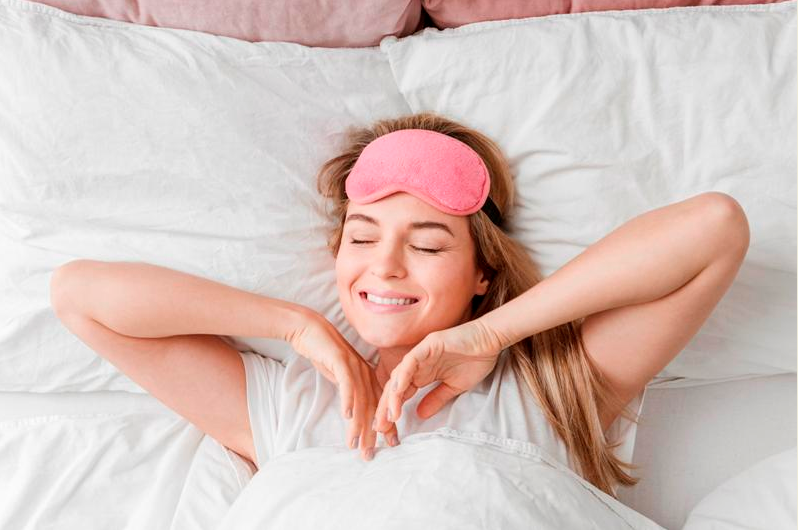
You toss. You turn. You glance at your alarm — you only have two hours left to get some shuteye. Panicked, you wonder how many more restless nights you can stand before you consider knocking yourself out with a sledgehammer.
If you have insomnia, it can make you more prone to physical illness and accidents. It can also do a number on your psyche.
While researchers continue to unravel the mysterious relationship between sleep and mental health, here are seven ways that getting enough rest improves your outlook.
It Lowers Your Cortisol Levels
What is cortisol? It is a critical hormone involved in the stress response, but it impacts nearly every system of your body, not only your central nervous system. It helps to regulate blood sugar levels and influences your blood pressure and heart rate.
It’s best known for picking up the slack for continued exertion after the initial surge of adrenaline wears off during the fight-or-flight response.
In small doses, cortisol increases immune function and gets you ready to fight off imminent threats. Your appetite diminishes as your body sends all available resources to your extremities to prepare for battle.
However, when your body becomes used to too much of this hormone in the blood, it grows resistant to its effects. Your appetite increases as your body continually feels the need to refuel for the next onslaught. You might develop hypertension, or high blood pressure, from the organ pumping harder to bathe your muscles in oxygen.
During sleep, levels of cortisol drop. It’s one of the reasons that researchers suspect spurs the association between weight gain and insomnia. When levels of this hormone plummet, you feel a sense of calm.
It Lessens Anxiety Symptoms
If you struggle with anxiety, getting adequate sleep might help decrease your symptoms due in part to the drop in cortisol levels. Getting a handle on this emotion can improve your life and lead to a positive upward spiral. When you feel less stressed, you make wiser decisions, and you’re more able to see the solution to problems that might otherwise cause you to throw up your hands in despair.
Adequate rest can also help you avoid the danger of addiction from self-medicating with drugs or alcohol. Approximately 50% of people with mental illness also experience substance abuse at some point in their lives. If you find yourself reaching for the bottle after a frustrating day, try refreshing yourself with a nap instead. Alcohol can help you fall asleep more quickly, but it can also disrupt your cycles.
It Regulates Your Neurotransmitters
When you start to feel sleepy, it’s because your hypothalamus produces gamma-aminobutyric acid (GABA). This neurotransmitter inhibits the functions of neurons containing various other brain juices, including norepinephrine and serotonin. These neurotransmitters also play crucial roles in depression and other mental illnesses. Researchers suspect that the interplay accounts for much of the insomnia depressed patients suffer, and why a good night’s rest can improve mood significantly.
It Helps You Maintain a Healthy Appearance
Have you ever looked in the mirror after a full night of counting sheep and groaned? You could suffer more than a temporary case of dark circles if insomnia continues to plague you. Researchers at Johns Hopkins discovered that a lack of sleep increases signs of skin aging and slows recovery from environmental stress, like exposure to sunlight. Like it or not, your physical appearance does impact your self-esteem, so to improve your sense of worth, try getting more Zzz’s.
It Aids in Concentration and Focus
If you struggle to concentrate, it affects every aspect of your health, including your psyche. An inability to focus at work can lead to financial woes and a loss of self-esteem. These problems tend to compound, sending you into a negative thought spiral from which escape seems almost impossible. Then, your anxieties keep you awake at night, which further multiplies your despair. Talking to your doctor about a temporary aid to help you rest might give you the strength you need to lift yourself out of your funk.
It Affects the Effectiveness of Your Antidepressant
If you are taking an antidepressant, getting adequate sleep might help it work more effectively. One study examined 68 individuals who researchers asked to sleep either six or eight hours each night during the first two weeks of taking fluoxetine. The eight-hour group was twice as likely to achieve full symptom remission after eight weeks of treatment. If you recently started a new prescription, try getting enough rest if you want to see relief more quickly.
It Calms Your Amygdala
If you ever “lost it” and flew off the handle at your spouse or children over a minor matter, you might need to get more shuteye. Your amygdala is the region of your brain associated with the fight-or-flight response. When it becomes agitated due to bombardment from outside stimuli, your behavior becomes erratic. Psychologist Daniel Goleman refers to this effect as “amygdala hijacking” — you do things in the heat of the moment that you later regret.
However, during sleep, activity in the amygdala relaxes. If a time-out doesn’t give you sufficient calm to reflect upon a challenging situation objectively, try sleeping on it. You may find the path forward comes to you when you awaken.
Improve Your Mental Health by Getting Adequate Sleep
The relationship between sleep and mental illness is complex. One thing researchers know for sure, though, is that an adequate rest benefits your psyche. So go ahead and treat yourself to that siesta.
Written by Jennifer Landis
About the Author
Jennifer Landis is a mom, wife, writer, and blogger at Mindfulness Mama. She’s quite fond of peanut butter, distance running, yoga, and drinking as much tea as possible. Find her on Twitter @JenniferELandis.
You may also like
The Impact of Sleep On Your Immune System
6 Tips to Avoid Stress While Working from Home
Depression and Vitamin D: Let There Be Some Sunshine
